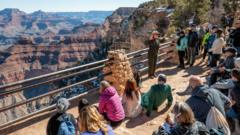As summer approaches, backlash mounts against substantial staffing cuts in national parks and national forests brought about by the Trump administration. The resulting decline in conservation efforts and public access has already begun to affect the visitor experience and safety.
Severe Cuts to National Parks Spark Public Outcry Ahead of Summer Season

Severe Cuts to National Parks Spark Public Outcry Ahead of Summer Season
Trump administration's deep staffing cuts to parks and forests raise concerns about conservation and visitor safety.
The impacts of cuts have become evident as longer lines greet visitors at park entrances, and visitor centers reduce operating hours. Staff reductions have left important roles vacant, particularly in remote areas of parks where public safety and environmental protection are vital. In Washington's Enchantments, ranger Kate White noted the uphill battle to maintain ecological standards without sufficient personnel for litter collection or trail care. "Without proper maintenance, ecosystems will suffer," she warned.
Thirteen weeks after mass terminations announced in mid-February, around 1,000 positions within the National Park Service were eliminated, along with an even steeper 10% cut from the U.S. Forest Service, compromising the safety of millions visiting these natural treasures. With popular parks like the Grand Canyon seeing car queues due to reduced staffing, advocates are voicing concerns over visitor service degradation. One recent closure of a popular Seattle-area trail highlighted how immediate consequences are taking shape as parks announce re-openings contingent on staffing levels.
A protest during Yosemite's "firefall" tradition highlighted frustrations as rangers and advocates hung an upside-down American flag in protest of the cuts. Staff members like biologist Andria Townsend, who focused on endangered species, echoed worries about the lasting impacts on wildlife conservation. The uncertainty surrounding endangered species like the Sierra Nevada red fox adds another layer of concern amid heightened unemployment within park operations.
Former Forest Service workers Claire Thompson and Xander Demetrios expressed their deep disappointment, recounting how years of dedicated work were summarily dismissed in the name of "performance." Advocacy groups warn that without swift action to restore positions, visitors must brace for significant drawbacks, including litter and reduced services during the peak season.
Elon Musk's government efficiency initiative claims success in saving funds, prompting supporters to hope for improvements; yet, detractors point out that a lack of evidence raises questions about long-term sustainability. With ongoing reductions, the risk of inadequate wildfire management looms as well.
As pressure mounts on the administration to address staffing issues, officials have recently committed to hiring seasonal workers, while critics continue to push for reconsideration of the cuts. The growing discontent from visitors and advocates alike signals the need for immediate action to safeguard the future of America's national parks and forests amidst shifting policies and priorities.
Thirteen weeks after mass terminations announced in mid-February, around 1,000 positions within the National Park Service were eliminated, along with an even steeper 10% cut from the U.S. Forest Service, compromising the safety of millions visiting these natural treasures. With popular parks like the Grand Canyon seeing car queues due to reduced staffing, advocates are voicing concerns over visitor service degradation. One recent closure of a popular Seattle-area trail highlighted how immediate consequences are taking shape as parks announce re-openings contingent on staffing levels.
A protest during Yosemite's "firefall" tradition highlighted frustrations as rangers and advocates hung an upside-down American flag in protest of the cuts. Staff members like biologist Andria Townsend, who focused on endangered species, echoed worries about the lasting impacts on wildlife conservation. The uncertainty surrounding endangered species like the Sierra Nevada red fox adds another layer of concern amid heightened unemployment within park operations.
Former Forest Service workers Claire Thompson and Xander Demetrios expressed their deep disappointment, recounting how years of dedicated work were summarily dismissed in the name of "performance." Advocacy groups warn that without swift action to restore positions, visitors must brace for significant drawbacks, including litter and reduced services during the peak season.
Elon Musk's government efficiency initiative claims success in saving funds, prompting supporters to hope for improvements; yet, detractors point out that a lack of evidence raises questions about long-term sustainability. With ongoing reductions, the risk of inadequate wildfire management looms as well.
As pressure mounts on the administration to address staffing issues, officials have recently committed to hiring seasonal workers, while critics continue to push for reconsideration of the cuts. The growing discontent from visitors and advocates alike signals the need for immediate action to safeguard the future of America's national parks and forests amidst shifting policies and priorities.






















